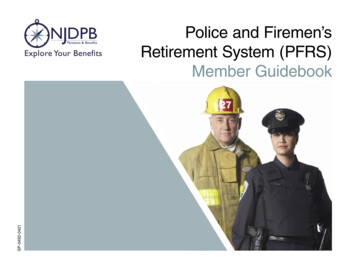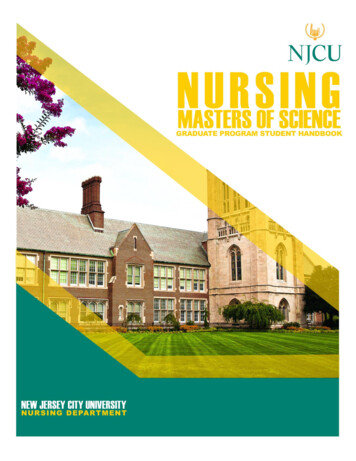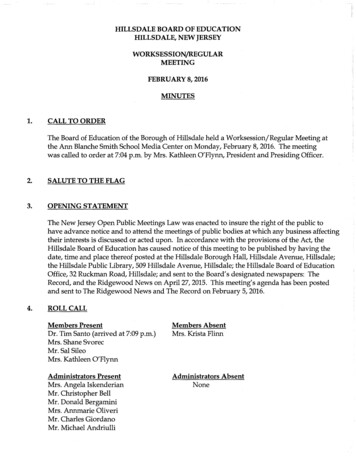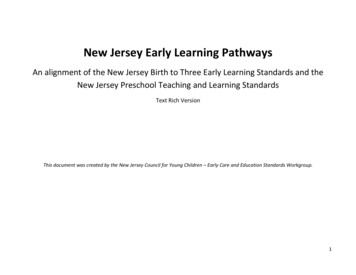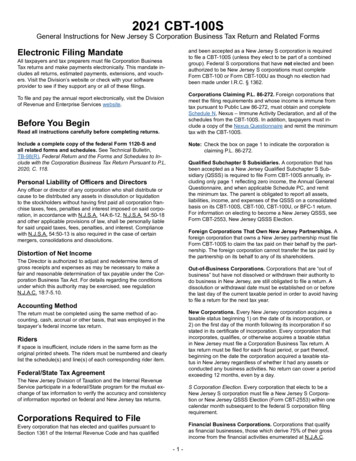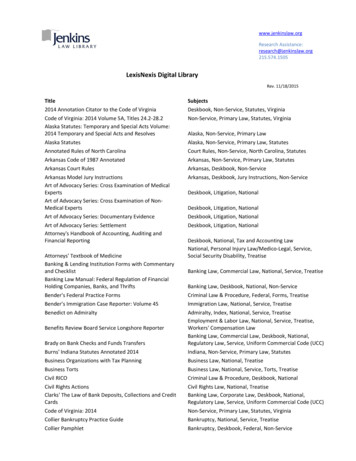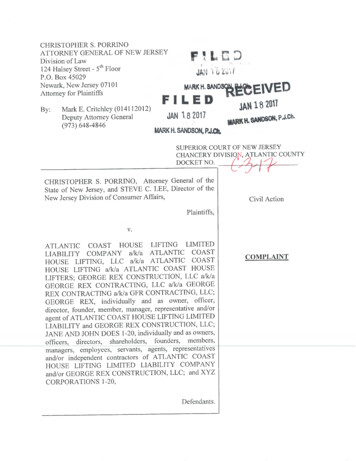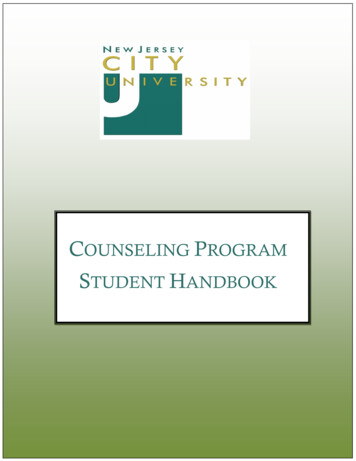
Transcription
wwwsssCOUNSELING PROGRAMSTUDENT HANDBOOKdfdf
Quick Reference GuideHelpful Phone Numbers:MA in Counseling Program201-200-3400University’s Main Number201-200-2000Graduate Studies Admission201-200-3409Graduate Studies Matriculation201-200-3306Graduate Graduation Clearance201-200-2085Bursar201-200-3045Financial Aid201-200-3173Library201-200-3016Office of Academic Services for Evening Students (OASES)201-200-2234, ity Bookstore201-200-3503, 201-435-6607For other telephone numbers, log onto the University directory at g Program Web PagesNJCU MA in Counseling Programhttp://www.njcu.edu/edld/counseling/NJCU MA in Counseling, Clinical Mental Health Counseling (60 credits, effective Spring 2013)NJCU MA in Counseling, Counseling Option (48 Credits closed to new NJCU MA in Counseling, School Counseling /1Effective Spring 2013 02-26-13
Welcome!Welcome to the Counseling Program at New Jersey City University. As you begin our Program, pleasetake full advantage of the opportunities available at NJCU. This Manual contains important informationthat will help guide you through your program. Please read the Manual carefully. Sign and return theacknowledgement page at the end of the book to the department secretary by the first week of class.As you progress through the program, there are important progress review points including completion ofthe 12 Credit Core Progress Review, Practicum Application, Internship Application, and your GraduateAudit. The New Student Orientation and Pre-Practicum Orientation are scheduled to prepare you with theinformation you need.The university provides many services to support you in your program. The NJCU University ServiceCenter (USC) serves as the "one-stop shop" for the University community. The USC was created toprovide students a convenient location to submit documents, retrieve forms and brochures, and conductgeneral enrollment and auxiliary related business transactions. Among the services provided areuniversity photo ID cards, parking, and shuttle information. Please become familiar with the WritingCenter, Library, Computer Center, Counseling Center, and other special services.Rossey Hall 536 is your program home at NJCU. Students seeking information or appointments withdepartment faculty members should contact the staff by calling 201.200.3400. Regular face-to-facecontact with your advisor and professors is essential. You are required to plan your program with youradvisor during your first year of study. Department bulletin boards are located on the walls adjacent toDepartment office. These boards are used for conveying information such as policy changes, classofferings, registration announcements and student organization announcements. We encourage you totake part in special events through our Graduate Counseling Student Association and through Chi SigmaIota, the International Counseling Professional Honor Society, and other social and service projects.We wish you success in your journey to becoming a counselor.The Counseling Program Faculty:Dr. Tracey M. Duncan – Co-ChairpersonDr. Vaibhavee AgaskarDr. Yumiko OgawaDr. Jane Webber2Effective Spring 2013 02-26-13
Table of ContentsCHAPTER 1: THE NJCU COUNSELING PROGRAM .5Mission StatementProgram ValuesCounseling Professional IdentityNJCU Diversity StatementDepartment and Program Web PagesPreparing for CACREP AccreditationDepartment of Educational Leadership and CounselingCounseling Program Faculty and StaffAdjunct FacultyFaculty AdvisorsMaking Advisement AppointmentsRequirements for AdmissionGuidelines for AppealClassroomsVideo Recording EquipmentStudent Evaluation of InstructorsCounseling and Student Support ServicesTurnitin.comCHAPTER 2: PROGRAM PLANNING.11New Student OrientationSteps for Course RegistrationProgram UpdatesRecommended Course Sequence PhasesCourse LoadRepeating CoursesCourse PrerequisitesCourse AvailabilityProgram Plan FormSemester Planning WorksheetCHAPTER 3: COUNSELING PROGRAM OPTIONS .16School Counseling OptionClinical Mental Health Counseling OptionCounseling OptionProgram Outcomes Assessment and Endorsement PolicyCourse Titles and DescriptionsCHAPTER 4: OVERVIEW OF PRACTICUM AND INTERNSHIP .34Practicum and Internship Manual and Forms ManualPracticum OrientationRequirements for PracticumPracticum Planning TimelineRequirements for InternshipInternship Planning Timeline3Effective Spring 2013 02-26-13
CHAPTER 5: CANDIDATE ASSESSMENT AND EVALUATION.40Candidate Assessment SystemSystematic Candidate Assessment Progress PointsE Portfolio E-Portfolio Progress Review PointsCandidate Core Review FormNJCU Academic Integrity PolicyCounseling Program Professionalism and Remediation PolicyNJDOE Certification: School Counselor, SACNJ Licensure: LAC, LPC, LCADCNJ Certification: DRCCExaminations: CPCE, NCECHAPTER 6: PROFESSIONAL COUNSELOR INVOLVEMENT .51Developing Your Professional Counselor Identity and Getting InvolvedNu Eta Sigma Chapter, Chi Sigma IotaOpportunities for Professional InvolvementCounseling Professional Organizations and ListservsCounseling Student Honors and RecognitionCHAPTER 7: UNIVERSITY POLICIES AND INFORMATON .54TechnologyBlackboardLibraryFinancial Aid and ScholarshipsGraduate AssistantshipsNJCU Academic Integrity PolicyNJCU General Statement on Students’ ResponsibilitiesNJCU Academic Grievance/Appeal ProceduresCounseling Program Professionalism and Remediation PolicyRequest for Course OverloadCHAPTER 8: FREQUENTLY ASKED QUESTIONS .59General Questions about the Counseling ProgramPracticum and InternshipLAC and LPC preparationSchool Counselor CertificationSupervision Certification for School Counseling or for Mental Health SitesSubstance Awareness Coordinator CertificationLicensed Clinical Alcohol and Drug CounselorINFORMED CONSENT FORM.684Effective Spring 2013 02-26-13
CHAPTER 1: THE NJCU COUNSELING PROGRAMCounseling Program Mission StatementThe Counseling Program prepares exemplary counselors who are caring, reflective, and culturallysensitive. As counselors we empower individuals and families to make positive changes in their lives andresolve personal, educational, career, and relationship problems. Our program reflects the goals and needsof a highly diverse, multilingual, and urban community of learners. We are committed to social justiceadvocacy to remove barriers to education and promote equity and optimal development for all personsand groups in urban, suburban, and rural settings.Counseling Program ValuesThe faculty, students, and staff work together in our shared journey toward professional excellence,personal growth, life-long learning, and service to others. We value caring, collaboration, equity,integrity, advocacy, empathy, diversity, and community.Counseling Professional IdentityOur faculty and students identify strongly with the counseling profession through membership in theAmerican Counseling Association and its national and state divisions such as the American SchoolCounselor Association, the Association for Mental Health Counseling, and the Association forMulticultural Counseling and Development.The ACA Code of Ethics and the ACA Multicultural Counseling Competencies and Standards are infusedin all courses. Eligible students, faculty and professional counselors may be inducted into Nu Eta Sigma,the NJCU Chapter of Chi Sigma Iota, International Counseling and Academic Honor Society.NJCU Diversity StatementNew Jersey City University is committed to creating a community that affirms and welcomes personsfrom diverse backgrounds and experiences and supports the realization of all human potential. Allcandidates are expected to demonstrate recognition and valuing of culture, language, gender,socioeconomic status, age, race, ethnicity, sexual orientation, exceptionality, and other forms ofdifference as assets in teaching and learning.Preparing for CACREP AccreditationThe Counseling program has served NJCU students and the region for more than 40 years and ispreparing for the accreditation process of the Council for Accreditation of Counseling and RelatedPrograms (CACREP). CACREP establishes and maintains standards for training and accredits graduatecounseling programs. Standards can be found at http://www.cacrep.org/ Considered the gold standard forcounseling programs, CACREP accreditation establishes professional preparation standards for studentspursing counseling careers. Completing a CACREP accredited program provides graduates with evidence5Effective Spring 2013 02-26-13
that they have been trained at an institution meeting the highest standards established by the profession,making them more competitive in the job market. In this transition, students may have questions about theCACREP accreditation process. Students are encouraged to ask questions and to meet with their facultyadvisors or programFaculty AdvisorsEach student is assigned a faculty advisor upon acceptance into the program. Students should meet withtheir advisor to plan their program in the first semester and their program plan must be on filed within thefirst year. Students whose last name begins with A-M are generally assigned to one faculty member, andstudents whose name begins with N-Z are assigned to a different faculty member. In addition, Postmasters are generally assigned to Co-Chairperson of the Department of Educational Leadership andCounseling. Students should check their admission letter for their assigned advisor.Making Advisement AppointmentsFaculty office hours are posted each semester on the Department office door and website. Students cancontact the department office at 201.200.3400 for assistance.6Effective Spring 2013 02-26-13
Department of Educational Leadership and Counseling Co-Chairs and StaffName and TitleEmailTracey M. Duncan, EdS, PhD, LPC, ACSCo-Chair (Counseling Program)Susan Phifer, PhDCo-Chair (Educational LeadershipProgram)Janette RodriguezDepartment du201-200-3400Counseling Program Faculty and StaffTracey M. Duncan, EdS, PhD, LPC, ACSAssistant ProfessorVaibhavee Agaskar, PhDAssistant ProfessorYumiko Ogawa, PhD, LPC, RPTAssistant ProfessorJane Webber, PhD, LPC, DRCCAssociate 1-200-3400201-200-3400Adjunct/Affiliate FacultyFemitchell Ashley, MA, ACSDaniel Cinotti, MAMichael Dubi, EdDAndrew Getzfeld, PhDCatherine Golfinopoulos, MA, ACSMarcela Kepicova, MEdSuzanne LaForge, MASabrina Magliulo, MA, EdSJose Maldonado, PhD., LPCScott Nelson, MARosa Perez, MARebecca Vicente, MSW, 00-31387Effective Spring 2013 02-26-13
Requirements for Admission to the Counseling ProgramIn addition to fulfilling the general graduate studies admission requirements, the admission andmatriculation requirements for the Counseling program consist of:1. A baccalaureate degree with a minimum 2.75 cumulative GPA.2. Graduate Record Examination (GRE) scores, General Test only. The GRE may be waived if thecandidate holds an advanced degree from an accredited institution of higher education in the UnitedStates or the evaluated equivalent of foreign academic credentials. Other test waivers may beoffered. Applicants should check for the latest test waiver policy at the Graduate Studies Home Page:http://www.njcu.edu/Graduate Students.aspx.3. Satisfactory completion of at least six undergraduate credits in Counseling or Psychology. Additionalgraduate and/or undergraduate work may be considered necessary for admission. In such instances,the student must complete an individual program plan in consultation with an assigned facultyadvisor.4. 500-word essay, reflective of the candidate’s personal counseling philosophy and counselordispositions, including the candidate’s future role as a counseling professional in an urbanenvironment.5. The “Recommendation Form for Graduate Degree Program” completed by two professionalsattesting to the candidate’s potential for graduate study in Counseling such as professors orsupervisors.6. Current Resume7. InterviewAfter a review of the candidate’s credentials and a successful interview with the Counseling ProgramFaculty, the candidate may be recommended either for matriculation or conditional admission.Students in the MA in Counseling Program are accepted for Fall and Spring Semesters only.Classrooms for Counseling CoursesThe majority of classes are held in Rossey Hall or in Karnoutsos Hall. The Department of EducationalLeadership and Counseling suite has a large and a small conference room for meetings, consultation,individual and group counseling role plays, and video recording. There are three rooms for counselingpractice and supervision, a play therapy room and a sand tray therapy room. Individual counselingpractice rooms are separated by a corridor from the lobby and have a separate entrance/exit. A counselingroom with a one-way mirror and a classroom observation room is available in Science Hall. Classroomsare also used in the summer at the Harborside Campus, 286 Washington Street.Video Recording EquipmentThe Counseling program provides video recording equipment for counseling skills practice and forpracticum and internship. Two rooms in the Counseling suite are equipped with TV monitors and two8Effective Spring 2013 02-26-13
rooms have desktop computers available for viewing recorded sessions. Students in courses requiringvideo recording are required to provide their own equipment. Camcorders may be borrowed from thedepartment office.Student Evaluation of InstructorsStudents have the opportunity each semester, to formally evaluate faculty who teach courses or who serveas supervisors of clinical experiences. After the faculty member leaves the room, a student volunteerreads the directions, distributes the scantron forms, collects and delivers the completed forms to theCollege of Education Dean’s Office.Students can discuss concerns with a faculty member by making an appointment with the faculty memberthrough the department office.Counseling Program Concern NoteFaculty members and site supervisors may complete a Counseling Program Concern Note when a studentdemonstrates an academic, professional or personal or other concern. Concerns may not require aProfessionalism and Remediation Policy review.ACA Student Membership and Other Practicum and Internship RequirementsNo student will be permitted to be on site during Practicum and Internship without current ACA studentmembership, an approved criminal history check including fingerprinting, and other program specificrequirements including HIPAA agreement (CMHC) or substitute teacher or NJDOE license (SC). Allprogram candidates and students will maintain active ACA student membership throughout theirenrollment in Practicum and Internship.Student ServicesCounseling CenterThe Counseling Center provides free, confidential counseling, support and referral for students.If you experience personal problems, distress, or situational crises, you are encouraged to contact theCounseling Center in GSUB 308 or call the Center at 201.200.3165. After hours, contact Public Safety at201.200.3128 or call 911 from off campus.Stress, anxiety, depression, interpersonal issues, alcohol or sleep issues, and death of a loved one havebeen rated in the top 10 health problems affecting college performance. Students do not have to faceproblems alone. Individual and group counseling is provided free to students of the university. Servicesfor veterans are offered through the Counseling Center.Announcements About Counseling ServicesStudents receive email announcements regarding services offered by the Counseling Center, the Healthand Wellness Center, and the Division of Student Affairs such as programs or meetings for test anxiety,anger management, stress, and academic skills; LBTGQ Support Group; and the Pathways to WellnessSeries.9Effective Spring 2013 02-26-13
Counseling services and programs at area counseling and human service organizations are circulated byemail and the bulletin board including Hudson Pride, Puerto Rican Family Institute, Hudson CountyCommunity College, Albert Ellis Institute, the Speicher-Rubin Women's Center on campus, the NewJersey Coalition Against Sexual Assault, and the Hudson County Rape Crisis Center. A CounselorReferral List for area counselors is provided upon request from the Counseling Program office and thefaculty.Opportunity Scholarship ProgramThe Opportunity Success Program (OSP) provides counseling for graduate students who were in the OSPprogram as undergraduates or who qualify for services.Career Planning and Placement OfficeThe Career Planning and Placement Office provides counseling, testing, placement and consultationservices. Mr. Michael Moriarty is the center liaison to the Counseling program and provides careercounseling, resume writing, editing, and job search services to Counseling Program students. Otherservices include computerized career guidance and decision-making programs (SIGI 3) and job interviewpractice, and career fairs.Office of Specialized Services for Special Needs Learners:The Office of Specialized Services provides confidential counseling and advisement services and supportfor students with special needs and disabilities. If you have a special need for which you are or may berequesting an accommodation, you are encouraged to contact both your instructor or assigned facultyadvisor and Ms. Jennifer Aitken, Director Administrator as early as possible in the term at 201-200-2557in the Karnoutsos Building.Writing CenterThe Writing Center is committed to improving students writing proficiency through one-on-one tutoring,workshops, and weekly conversation groups. The Writing Center is located in Karnoutsos 115. Allwriting tutor appointments are scheduled online: RNITIN.COMStudents agree that by taking this course all assignments are subject to submission for textual similarityreview to Turnitin.com. Assignments submitted to Turnitin.com will be included as source documents inTurnitin.com’s restricted access database solely for the purpose of detecting plagiarism in suchdocuments. The terms that apply to the University’s use of the Turnitin.com service are described on theTurnitin.com web site. For further information about Turnitin, please visit: http://www.turnitin.com.10Effective Spring 2013 02-26-13
CHAPTER 2: PROGRAM PLANNINGNew Student OrientationNew students are required to attend the New Student Orientation before their first semester. The purposesof the New Student Orientation are to: (a) introduce students to the program, (b) assist new students withcourse advisement and registration, (c) meet faculty advisors, and (d) acquaint students with other newstudents and department faculty members. Please check the Counseling web page for the date and time ofthe New Student Orientation or contact the department office at 201-200-3400Steps for Course Registration1. After you have received your admission letter, check the dates for the New Student Orientationon the Counseling web page or contact the department office at 201-200-3400.2. Obtain your Gothic card, student email, and Gothic Net ID and password to register online forcourses. Follow directions in your admission letter.3. Plan your program with your advisor at the New Student Orientation or an individual advisementappointment. You must complete your program plan with your faculty advisor before the end ofyour second semester.4. COUN 601 and COUN 607 must be completed within the first nine credits, preferably in the firstsemester of study, but no later than the second semester. The four Core Courses should be takenas early as possible and by the end of the first two semesters: COUN 601, COUN 605, COUN607, and COUN 608.5. Check your NJCU email and the Counseling Program website regularly for orientationinformation, program updates, registration dates, and schedule changes. The bulletin boardsoutside the department offices also provide announcements and updates.6. Syllabi for the courses in which you are enrolled are posted on Blackboard during the semester ofenrollment.Program UpdatesApplicants and continuing students should be aware that programs may be revised in response to changesin certification, licensure, and accreditation. Applicants and students should refer to the EducationalLeadership and Counseling Department pages on the NJCU website for updated program /grad leader.asp11Effective Spring 2013 02-26-13
Recommended Course Sequence PhasesPhase 1Phase 1 courses provide an introduction to the knowledge, skills, and dispositions required.These courses provide a foundation for advanced courses. Four core courses must be taken early inthe program. COUN 601 (formerly 626) and COUN 607 (formerly 625) must be taken in the first 9credits and by the end of the second semester by full time students. The four Core Courses should betaken as early as possible and by the end of the first two semesters: COUN 601, COUN 605, COUN 607,and COUN 608.Phase 2Phase 2 courses are advanced courses that build on the foundations learned in Phase 1.Phase 3Phase 3 courses are your field experiences and advanced electives. Thirty credits including thefour core courses must be completed before Practicum.Course LoadFull time students take nine or more credits. Full time study is permitted for the student who iseither not employed or employed not more than 20 hours per week. Any student employed fulltime will be permitted to enroll for not more than six credits per semester. The maximumsummer session course load is six graduate credits per term. A student may not register forcredits in excess of those mentioned except with the approval of their advisor, the chair and theDean of Graduate Studies.Repeating CoursesStudents with a grade of B- or lower in any course are required to repeat the course successfullythe next semester and their progress will be reviewed according to the Student ProfessionalismPolicy. Original grade remains on the transcript.Program Plan FormStudents are required to complete a tentative Program Plan with their faculty advisor by the endof the second semester, preferably by the end of the first semester. Each option has a differentProgram Plan form.Counseling Program Planning WorksheetThe Counseling Program Planning Worksheet shows how you have planned for the number andsequence of courses.12Effective Spring 2013 02-26-13
COURSE INFORMATIONStudent can refer to Individual Program Plan for former Course TitlesCOURSE #COUN 601(formerly 626)COUN 603COUN 604COUN 605COUN 606COUN 607(formerly 625)COUN 608COUN 609COUN 610COUN 616COUN 629COUN 631COUN 632COUN 636COUN 640(formerly 696)COUN 642(formerly 697)COUN 644COUN 650(formerly 615)COUN 652(formerly 650)COUN 654COUN 658COUN 663COUN 686TITLECOUN PrerequisitesOrientation to Professional Counseling and EthicCounseling and Development Across the LifespanAppraisal and Assessment in CounselingCounseling TheoriesResearch and Program EvaluationGroup ProcessCounseling SkillsDifferential Diagnosis of Maladaptive BehaviorClinical Mental Health CounselingCounseling, Consultation, Referral, and Resources inSchoolsMulticultural CounselingPsychopharmacologyFamily and Couple CounselingGroup Counseling Theory and Practice601, 605, 607, 608601, 603, 605, 608601, 607, 608603, 609605, 607, 608,Counseling Children and Adolescents603, 605, 608, 609Play Therapy608Parent-Child Play Therapy608Foundations of Addictions CounselingAssessment, Treatment Planning, and Interventions inAddictions CounselingAddictions Counseling: Prevention and InterventionPrograms and ResourcesAddictions Counseling: Family Systems Assessment andTreatmentCareer Counseling and DevelopmentCase Conceptualization and Treatment Planning inCounselingCOUN 690Practicum in CounselingCOUN 691COUN 694COUN 695COUN 698COUN 699COUN 700COUN 701COUN 703Advanced Counseling Theory and TechniquesInternship I in CounselingInternship II in CounselingDisaster, Trauma, and Crisis CounselingCounseling SupervisionInternship III in CounselingInternship IV in CounselingIndependent Study in Counseling601, 603, 605, 608601, 605, 608, 60930 credits, 601, 605, 607,608, permission601,605, 608COUN 690, permissionCOUN 694, permission605, 608, 609COUN 690COUN 695, permissionCOUN 700, permissionpermission13Effective Spring 2013 02-26-13
Course AvailabilityRegister early! Courses with insufficient enrollment may be cancelled and course offerings are subject tochange. Summer courses are often offered in alternate years. Number indicates number of sections.COURSE #COUN601(626)*COUN 603COUN 604COUN 605COUN 606COUN 608COUN 607(625)*COUN 609COUN 610COUN 616COUN 629COUN 631COUN 632COUN 636COUN 640(696)*COUN 642(697)*COUN 644COUN 650COUN 652COUN 654COUN 658COUN 663COUN 686COUN 690COUN 691COUN 694COUN 695COUN 698COUN 699COUN 700COUN 701COUN 703TITLEOrientation to Professional Counseling and Ethics(formerly 626)Counseling and Development Across the LifespanAppraisal and Assessment in CounselingCounseling TheoriesResearch and Program EvaluationCounseling SkillsFALLSPRINGXXXXXXXXXXXXXGroup ProcessXXXDifferential Diagnosis of Maladaptive BehaviorClinical Mental Health CounselingCounseling, Consultation, Referral, and Resources inSchoolsMulticultural CounselingPsychopharmacologyFamily and Couple CounselingGroup Counseling Theory and PracticeXXXXXXXXXXXXXXXXXXCounseling Children and AdolescentsPlay TherapyXParent-Child Play TherapyFoundations of Addictions CounselingAssessment, Treatment Planning, and Interventionsin Addictions Counseling (formerly 615)Addictions Counseling: Prevention and InterventionPrograms and ResourcesAddictions Counseling: Family Systems Assessmentand TreatmentCareer Counseling and DevelopmentCase Conceptualization and Treatment Planning inCounselingPracticum in CounselingAdvanced Counseling Theory and TechniquesInternship I in CounselingInternship II in CounselingDisaster, Trauma, and Crisis CounselingCounseling SupervisionInternship III in CounselingInternship IV in CounselingIndependent Study in tive Spring 2013 02-26-13
Semester Planning WorksheetStudentMatriculation DatePlanned Graduation er15Effective Spring 2013 02-26-13
CHAPTER 3: COUNSELING PROGRAM OPTIONSMaster of Arts in Counseling: School Counseling Option48 creditsThe MA in Counseling with an option in Counseling with School Counselor Certification is a New JerseyDepartment of Education approved program. The 48-credit program prepares culturally sensitive schoolcounselors to provide professional counseling, consultation, collaboration, assessment, and referralservices in comprehensive P-12 school counseling programs. School counselors work proactively asschool leaders, change agents, and advocates for all students.School Counseling Program Area ObjectivesAfter completion of the MA in Counseling Program, School Counseling option, candidateswill be able to:Deliver developmentally and culturally responsive assessment, counseling and consultation forearly childhood, elementary, middle, and high school studentsIntegrate evidence-based and strength-based, practices in comprehensive school counselingprogramsCollaborate with multidisciplinary teams in the school and community to deliver prevention,intervention, collaborative consultation, crisis intervention, and disaster response programsRespond to individuals, families, schools, and communities affected by disaster, crisis, and traumacausing eventsAssess the needs of diverse clients within the context of multicultural development and wellnessacross the lifespanDemonstrate ethical counselor skills, continuous professional development, and counselor self careEvaluate counseling practices and programs using current research and technological methodsCollaborate with parents, inter-professional community agencies, and resources to enhance theacademic, personal-social, and career development and wellness of studentsPromote systemic change in schools through the counselor’s role as a leader and advocate for allstudentsEmpower students to meet their educational, lifestyle, and career needs16Effective Spring 2013 02-26-13
SCHOOL COUNSELING OPTION48 CreditsPhase 1 (24 credits)COUN 601COUN 603COUN 604COUN 605COUN 606COUN 607COUN 608COUN 609Orientation to Professional Counseling and Ethics* (626)Counseling and Development Across the LifespanAppraisal and Assessment in CounselingCounseling Theories*Research and Program EvaluationGroup Process* (625)Counseling Skills*Differential Diagnosis of Maladaptive Behavior33333333Phase 2 (
NJCU Academic Integrity Policy Counseling Program Professionalism and Remediation Policy NJDOE Certification: School Counselor, SAC . Students should check their admission letter for their assigned advisor. . EdD dubi@comcast.net 201-200-3400 Andrew Getzfeld, PhD agetzfeld@njcu.edu 201-200-2320 Catherine Golfinopoulos, MA, ACS cgolfinopoul .
